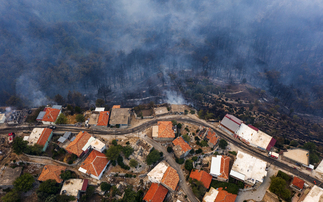Experts offer new task force seven ideas on how best to increase corporate transparency on climate-related risks
The climate risk task force set up during the Paris climate talks and fronted by former New York Mayor Michael Bloomberg met for the first time on Tuesday to hear advice from a range of players already working to promote the disclosure of climate information by business.
The task force, which was established in December following a proposal from the Financial Stability Board (FSB) to create a dedicated body to improve climate-related disclosures, brings together a range of industry experts and counts senior executives from the insurance, banking, and consumer goods sectors as its vice-chairs. The initial challenge before the task force is to lay out the group's scope and goals by the end of March - though as Eric Hespenheid from the Global Reporting Initiative (GRI) told the group at a meeting at Bloomberg's offices in London on Tuesday, simply defining what the FSB means by "climate risk" is an unenviable task.
BusinessGreen outlines some of the advice the task force received this week on what its remit should be from many of those who have worked with businesses on climate risk management for years.
1. 1. Climate-related risk should cover all industries - and include the financial sector
Climate risks and opportunities are widespread, and limiting recommendations to high carbon and energy intensive industries would slow down the uptake of more sustainable business models, said Mindy Lubber, president of sustainable investor group Ceres.
"Industries from energy, insurance, transportation, real estate, finance, agriculture and food are clearly impacted by climate risks and opportunities, and they ought to be disclosing," she advised.
Moreover, the task force needs to include climate disclosure from relevant actors in the financial sector as well as the real economy in the scope of its work, said Eric Usher, acting head of the United Nations Environment Programme Finance Initiative (UNEP FI). "If investors were really expected to fully disclose themselves and were scrutinised on both the quality of their own disclosure as well as how their disclosed performance fares over time, this would really create a truly intrinsic interest for investors to demand from companies the most complete and meaningful material and accurate disclosure of finance-related risks," he said.
He added, however, that requirements for disclosure reports, approaches and metrics from financial actors should differ from those in the real economy.
2. Help fossil fuel companies face up to the facts
Despite the Paris Agreement, oil companies such as Exxon, Shell and BP are still projecting high growth scenarios for the next 25 years, said Mark Campanale, founder and executive director of Carbon Tracker - a fact evidenced this week by BP's latest Energy Outlook and its prediction emissions will rise by a fifth by 2035. "The reason for that is that they don't recognise a low demand scenario for their products, and so when it comes to their filings, they have to say [their] business judgement is that there is no other scenario other than growth for [their] products," Campanale said.
However, the real risk, he said, is in oil companies using capital generated by current projects to develop the next generation of projects. "In the debate recently that Shell had with their shareholders about the carbon bubble and stranded assets, their core message was that they don't see demand disappearing for their products," he said. "So we have to ask ourselves, how can we achieve the climate goals when companies are planning to use shareholder funds to go full steam ahead?"
Campanale and his influential Carbpon Tracker group argue the task force needs to look at how regulators can issue guidance notes and other types of advice to "get companies to align the numbers with the rhetoric".
3. Emphasise stress tests
Disclosure of improved information on climate risks will also give the market an overview of how much CO2 is really under development - and whether it is compatible with the "well below 2C" goal that the Paris Agreement set out. "After Paris no responsible energy company that faces material climate risks can ignore the imperative to stress test its business against the global agreement," said Lubber. "Every company that faces material climate risks should explain to their investors how climate-related risks and opportunities are likely to affect their businesses, over what time frame, and their strategy for managing these risks."
Businesses must also think about what this "2C stress-test" really means, said Campanale. "What it boils down to is what do you as a board of a company think will be the demand for your product, and actually how does demand change your plans for supply."
It's also crucial that companies disclose their public policy positions, and how they are influencing public policy either directly through lobbying in Washington and Brussels or indirectly by other trade associations they are part of, said Stephanie Pfeifer, chief executive of the Institutional Investors Group on Climate Change (IIGCC). "There's absolutely no point in us all getting excited about 2C scenarios if a company is throwing billions to policy makers to lobby against exactly that happening."
4. Focus on all types of risk - as well as opportunities
While an obvious focus of the task force will be on carbon emissions and other types of climate-related disclosure, it must also go beyond these direct risks and consider other risks, including physical, reputational, policy, litigation, and weather-related risks, recommended Pfeifer. "Above all what investors need is forward-looking data and a much more complete narrative that addresses the range of reporting measures across the different types of risk," she said.
The medium and long-term risks of climate change must be disclosed, added Lubber, while investors also want to know what kind of in-depth strategies companies have for addressing other risks - noting in particular that fiduciary duty demands that board members address material risks. "Every company that faces material climate risks should explain to their investors how climate-related risks and opportunities are likely to affect their businesses over what time frame, and their strategy for managing these risks," she said.
However, while much focus is understandably put on risks, the task force must also look at the climate from the performance side, said UNEP FI's Usher. "If the focus is only on risks, we could have a problem - for example an investor can fully divest from all activities that gives him some climate risk exposure without actually doing anything to contribute to financing our transition to a low carbon economy," he said.








